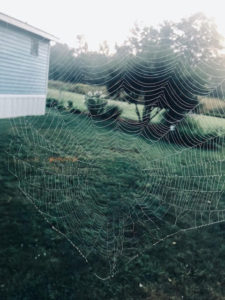Early one morning, sunlight on the morning dew illuminated this intricate spider web stretched between our two bird-feeding stations. Still in my nightwear, I grabbed my iPhone, slipped my feet into my ‘yard shoes’ and went out to snap some photos.

The ‘seemingly impossible’ is nature’s way.
Most everyone has seen spider webs suspended between two trees. Amazing that a spider is able to spin a web that reaches across a distance of more than several feet. Spiders have a remarkable ability to make solid threads. The spider does this by physically pulling the spider silk through silk-secreting organs (called spinnerets) on its abdomen. Once the thread is started, the spider lifts its spinnerets into the breeze.
Any slight breeze, including solar currents, can carry the lightweight thread from point-to-point. The secret is in the breeze.
Usually hanging from underneath, the spider is able to easily ride the breeze to move back and forth on the web, like walking on a tightrope. Depending on what time of day they hunt, spiders rebuild their intricate web each day or night.
By the time my husband was up, this web was gone, with only one thin string as evidence of its previous existence, and my photos as proof of its magnificence.
Nature’s ways are elaborate, efficient, and effective. Sometimes spiders eat their old web, digesting the substance to build again.
Lakota elder, Joseph Marshall, is a teacher, historian, writer, and story teller. He is author of Walking with Grandfather: The Wisdom of Lakota Elders. In a Sounds True interview with Joseph Marshall, Tami Simon asked him the key ideas about how to work with difficulty when it emerges in our lives. Marshall said, “…[F]irst of all, we have to understand that life comes with difficulties. There are problems. There are obstacles. There are situations for us to attend to day in and day out. Once we understand that reality, that’s the most important aspect of dealing with difficulty and persevering.”
The basis of Buddhism is a doctrine known as the Four Noble Truths. The First Truth is that suffering, pain, and misery exist in life. The viewpoint is that suffering and dissatisfaction exists in life. You will inevitably have to endure physical suffering such as pain, sickness, injury, tiredness, old age, and eventually death. Like the spider’s web, you are never able to keep permanently what you strive for. Happy moments pass by, and soon you will too.
Sad moments, including any current suffering, also pass by.
Simon asked Marshall if there was a story that sums everything up. He tells of a habit when he would be walking with his grandfather, sometimes gathering wood or simply on their way somewhere. In a curious way, his grandfather would stop, turn him around, and say, “Grandson, look back at the way we came.”
After a few years, one day Marshall asked why he was being made to look back.
“Because, Grandson, one of these times I’m going to send you down this trail by yourself and if you don’t remember the way you came, you will be lost.”
Like the grandfather’s actions, nature’s ways can appear peculiar unless we understand the lessons. Human lives are as fleeting as the spider’s web, and just as magnificent.
The secret of being able to span the distance is the breeze. Breeze makes the seemingly impossible possible.
The word spirit in both Hebrew and Greek means breath or wind or breeze….
